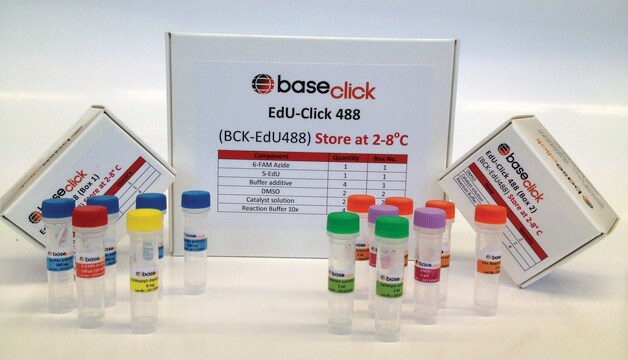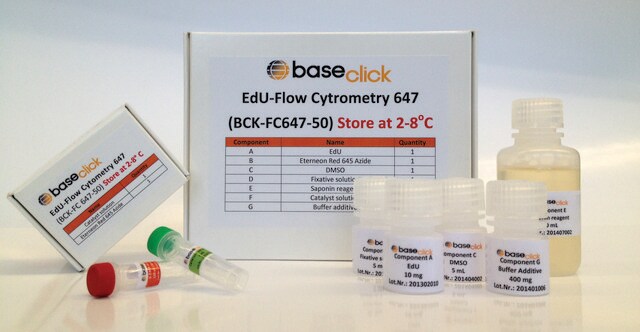BCK488-IV-HTS-S
In Vivo EdU HTS 2x96 Kit 488
sufficient for 200 assays
About This Item
Produits recommandés
Fluorescence
λex 496 nm; λem 516 nm
Conditions d'expédition
wet ice
Vous recherchez des produits similaires ? Visite Guide de comparaison des produits
Description générale
1. Imaging kit (BCK-IV-IM)
2. Flow cytometry kit (BCK-IV-FC)
3. High throughput screening – HTS kit (BCK-IV-HTS)
You can select the above kits with the dye of choice and the right EdU content for your animal model.
Depending on your animal model or the number of animals to be tested you can choose between three kit sizes S, M, and L with increasing EdU content, as indicated in the following table.
Kit Size Content of EdU
S 50 mg
M 500 mg
L 1000 mg
Application
Mention d'avertissement
Danger
Mentions de danger
Classification des risques
Acute Tox. 4 Inhalation - Acute Tox. 4 Oral - Aquatic Chronic 3 - Eye Dam. 1 - Muta. 1B - Repr. 2 - Skin Corr. 1C
Risques supp
Code de la classe de stockage
6.1C - Combustible acute toxic Cat.3 / toxic compounds or compounds which causing chronic effects
Faites votre choix parmi les versions les plus récentes :
Certificats d'analyse (COA)
It looks like we've run into a problem, but you can still download Certificates of Analysis from our Documents section.
Si vous avez besoin d'assistance, veuillez contacter Service Clients
Déjà en possession de ce produit ?
Retrouvez la documentation relative aux produits que vous avez récemment achetés dans la Bibliothèque de documents.
Global Trade Item Number
| Référence | GTIN |
|---|---|
| BCK488-IV-HTS-S | 4061833556368 |
Notre équipe de scientifiques dispose d'une expérience dans tous les secteurs de la recherche, notamment en sciences de la vie, science des matériaux, synthèse chimique, chromatographie, analyse et dans de nombreux autres domaines..
Contacter notre Service technique



